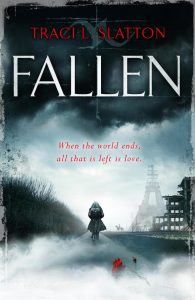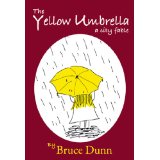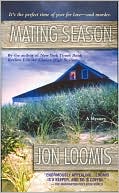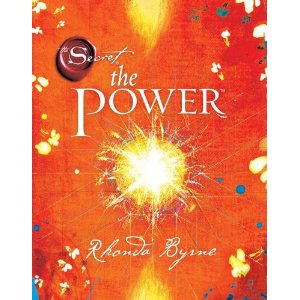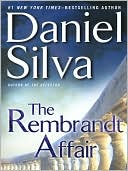Great review of FALLEN, and fun guest post….
Drey’s Library blogspot asked me to write a guest post on how I get inspiration. This was fun…. Then my novel FALLEN got an “Excellent!” from Drey. Thanks to Drey for the opportunity and the wonderful read!
drey’s thoughts: Fallen starts off with a bang, capturing your attention right away…
I was flattened against a brick wall, watching in terror as she struggled not to inhale the killing mist that pulsed a few centimeters from her face. If she breathed it in, it would kill her. If she moved into it, or if it moved to engulf her, it would kill her. Dissolve her from within, filling her mind with madness before blistering her cells with heat until she ruptured into steam and water droplets. All that would be left of her would be a splatter of water on the ground and a fine beige powder sifting down from the air.Yikes!! This is so not a world I want to live in–a mysterious mist that kills, rogue bands of survivors who round up women and children for far more nefarious purposes than you could imagine, dwindling food supplies…
It is in this world that Emma Anderson finds herself in charge of her five-year-old daughter Mandy, and seven other children; trying to survive and keep them safe and alive. When she meets a band of men who are seemingly able to keep the mists away, Emma barters for protection for herself and the children. Before she knows it, she’s healing the camp’s sick and making friends. Well, except for a few of the men…
I like Emma. She’s strong, she’s resolute, and she’s fearless in standing up for those who can’t help themselves–almost to the point of getting herself killed. I like that some of the survivors have acquired a new skill, like Emma’s healing.
The plot is simple (survive), the story is moving. I enjoyed reading Fallen, and the realization at the end makes me antsy to find out what happens in the sequel to this first-in-a-trilogy.
drey’s rating: Excellent!
By Traci L. Slatton,
Author of Fallen
This topic fascinates me, because I wrestle with it every day. I am a creative person and I have a lot of ideas for stories. I’m also hungry. I’m starving to write 100 books before they peel my cold, dead fingers off my keyboard and lay me in a plain pine box. Then there’s another consideration: writing is misery. Every page is agony.
Ideas come and I take notes. If I’m walking, I’ll make a voice memo. Usually characters stuck in tense situations, and bits of their dialogue, come to me first. Sometimes I’ll get a palpable feeling-sense of a relationship: the tenderness and eroticism and playfulness and fierceness of it. I also see my main characters in my mind’s eye. With FALLEN, my recent post-apocalyptic romance, I had a vision of Europe in shambles, and a man and a woman who were both very strong and very tormented. She was willing to do anything to keep some children alive, but she was strongly connected to an absent husband. So the premise came to me first. I had a clear sense of the man as good and bad, a leader, a striated human soul. I could feel his essence.
Usually I won’t start writing until the idea threatens to shove bamboo shoots up my fingernails if I don’t write it. That’s when compulsion has set in. The beginning is great fun. It’s a rush. I’ve never been interested in drugs but I always think that the rush of creative energy when I finally surrender to a story must be like the rush of some potent chemical. It’s intense, it’s alchemical, it consumes me. It’s like falling in love, because it’s all I can think about. I walk down the street with scenes scrolling through my brain. I feel alive in a new way.
After that initial rush, the work sets in. Maybe it’s like a marriage at this point. You know, when the honeymoon has worn off and you’re sick of picking up your spouse’s toenail clippings from the coffee table and you just want to throw a heavy wrench at his head. It’s a lot of unglamorous work. Here’s when I mock up an outline of the story, the main turning points, and the character arc. I grapple with the nuts and bolts of story, and the fundamentals of what I aim to do with this particular one.
Best I’ve figured out, and this is an on-going inquiry for me, story is what your main character wants and how they DON’T get it. All story has a common source: it’s an argument for a specific value. And all good fiction has two qualities: 1, it’s about truth but not necessarily about fact, and 2, it is structured around conflict and obstacle.
So I have scenes, obstacles, disasters, bits of dialogue, and the faces of my characters all jumbled up in my brain, and I sit down and start writing the first few chapters. Then I pause to write an outline. I also figure out what value I am arguing for. I am opinionated and I have strong values, which helps. I write out my value on a sticky note and tape it to the side of my iMac.
I also almost always have a clear sense of the ending of the story. With FALLEN, I saw my heroine riding off without her man. I saw her heart-broken and determined. I enjoy writing stories where the stakes are high, so I tweak the plot points to up the ante. How can I push a scene? How can I turn up the volume on a character’s breaking point?
Writing is an arachnoid process: it’s like weaving an intricate web from the silk in my gut. That weaving happens in the back and forth between the vast, oceanic creative flow and the careful structuring of analytical thought. Both are crucial.
I usually do research as I am writing. I’ll pause in the middle of a page and read six chapters in a book, or google around the internet, or send emails to people I know who might have answers. A small plane flies from Edmonton to Le Havre in Fallen, so I emailed my friend Geoffrey, who’s a pilot, to ask him how that would be done. He had some ideas and he emailed some of his friends, too. When I have my answers, I resume writing. If I need to do further research, then, after a day or so, I’ll keep writing and start reading the necessary texts at night.
The end is another rush, because I get excited to torture my main characters more intensely, and so finish the story. Finally I have a first draft. Here’s where I ask a few trusted friends to read and critique. I’ve also found a free-lance editor who is scary smart, and I have her read the draft. Then I go back and revise, revise, revise . . .

